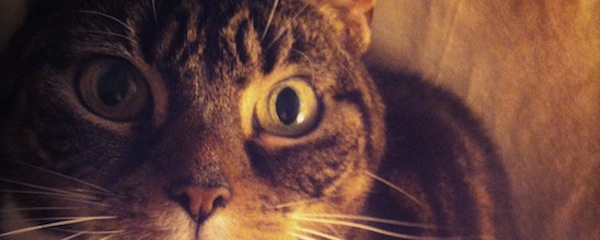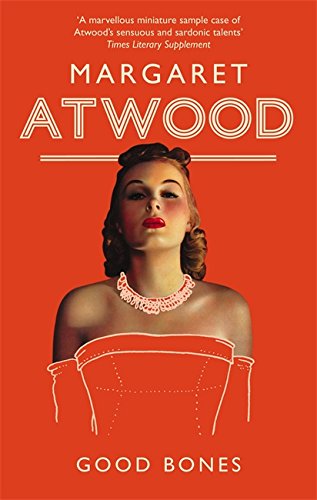
('Spooky' © VHS, 2014)
SHORT-SHORT STORIES WITH BIG-BIG IMPACT:
THE FLASH OF MARGARET ATWOOD
by SANTINO PRINZI
~
When you hear the name of prize-winning author Margaret Atwood many books are sure to spring to mind: The Handmaid’s Tale and the MaddAddam trilogy, for instance. Perhaps her most recent short story collection, Stone Mattress, which was published in September 2015. Or even her latest release, Hag-Seed, which is Atwood’s re-imagining of Shakespeare’s The Tempest – part of a series of Shakespeare plays retold by novelists. Then there is her flash fiction, perhaps not as celebrated but, like her novels and short stories, it resonates long after reading.
Atwood’s flash doesn’t always contain a traditional narrative, but this doesn’t prevent her from telling us a story, from making us think and feel. An excellent example of this is the story ‘Bread’ from her 2010 collection, Murder in the Dark. It is told from a second-person perspective, a style that can make a reader feel uncomfortable and uneasy, and that certainly seems to be what Atwood was aiming to achieve in this flash fiction. Atwood takes a loaf of bread, an everyday object that we take for granted, and shows us the power this simple item has by making the reader imagine various scenarios. The story opens with the following two sentences, carefully setting up the premise: ‘Imagine a piece  of bread. You don’t have to imagine it, it’s right here in the kitchen, on the bread board, in its plastic bag lying beside the bread knife.’ It goes on to paint a scene where bread is plentiful and slathered in butter, peanut butter, and honey.
of bread. You don’t have to imagine it, it’s right here in the kitchen, on the bread board, in its plastic bag lying beside the bread knife.’ It goes on to paint a scene where bread is plentiful and slathered in butter, peanut butter, and honey.
These opening sentences act as an introduction to the imagination, encouraging us to think about the world we live in and all that is wrong with it. If we are lucky, which Atwood must assume her readers are, we don’t need to imagine a loaf of bread in our kitchens because we have one or, indeed, many, but the scenarios Atwood then asks us to put ourselves in expose our natural tendency to overlook the things we are fortunate enough to have. The strongest scene, for me, is where we are asked to imagine a famine and Atwood immediately transports us to a ‘thin mattress’ in a third-world country. You and your dying sister are both hungry for the morsel of bread remaining. Atwood asks:
Should you share the bread or give the whole piece to your sister? Should you eat the last piece of bread for yourself? After all, you have a better chance of living, you’re stronger. How long does it take to decide?
How could you make a choice in a situation where your own life, and that of another so important to you, depends on this decision? It is, in this way, that Atwood’s flash fiction remains in the mind: you may not cry or laugh, but you will think, and for a long time afterwards too.
Not all of Atwood’s flash fiction forces you to deliberate over important issues. Some stories are wonderfully playful; Atwood is a fan of reinventing myths or stories that are very familiar, and Hag-Seed is not the first time Atwood has turned to Shakespeare for inspiration. ‘Gertrude Talks Back’, from her 1992 collection Good Bones, is a retelling of Shakespeare’s Hamlet, told from the point of view of his mother, who addresses Hamlet directly throughout this story. Gertrude’s point of view is enlightening as she reveals her thoughts on the name ‘Hamlet’, and how she wished to call him ‘George’, and how her marriage with her late husband was an unhappy one. There are many other playful revelations, but I’ll refrain from giving them all away.
Not only does Atwood transform narrative perspectives, but she also reinvents forms too. ‘Making a Man’, from Good Bones, is written as a women’s magazine article, offering various methods of constructing a man. This isn’t quite a reversal of the view that women can be moulded by men – though the idea is present – but the tone of the article grows more menacing towards its trailed off ending:
Why shouldn’t you concoct one of these cunning fellows for your very own? No reason at all! Just coat your hubby with plaster of Paris, and
 By simply cutting off the narrative here, Atwood leaves a harrowing impression on her readers. She is acknowledging that the sinister route the article is taking is unavoidable, leaving the reader to use their own imagination to take the story to the darkest recesses of their mind. What would you do after covering your husband with plaster of Paris?
By simply cutting off the narrative here, Atwood leaves a harrowing impression on her readers. She is acknowledging that the sinister route the article is taking is unavoidable, leaving the reader to use their own imagination to take the story to the darkest recesses of their mind. What would you do after covering your husband with plaster of Paris?
‘Our Cat Enters Heaven’ is another unusual flash, this time from her 2006 collection The Tent. The very first sentence plunges us into the narrative: ‘Our cat was raptured up to heaven.’ The story continues in this manner, encouraging the reader to accept this visage of heaven for the cat, and heaven becomes the place where, as God describes, ‘all things are revealed’, including the cat’s testicles:
Our cat has always known his testicles must be somewhere. One day he’d woken up from a fairly bad dream and found them gone. He’d looked everywhere for them – under sofas, under beds, inside closets – and all the time they were here, in heaven. He went over to the bush, and, sure enough, there they were. They reattached themselves immediately.
In stories with a surreal edge, I feel it’s important that the world constructed by the author is believable; as a reader, I don’t want to just read stories, I want to experience them. Here, Atwood explores the mind of this cat in an entirely convincing way. Like ‘Making a Man’, the story ‘Our Cat Enters Heaven’ appears playful and light-hearted, but it doesn’t take long for the tone to shift, for the narrative to darken. Throughout the story the cat notices ‘little pink things running around that he thought at first were mice’, but God tells him that ‘they aren’t mice’ and encourages him to ‘catch as many as you like. Don’t kill them right away. Make them suffer.’ The cat compiles:
Already he’d pounced on one. He held it down under his paw. It was kicking, and muttering tiny shrieks.
They’re the souls of human beings who have been bad on Earth, said God, half-closing its yellowy-green eyes. Now if you don’t mind, it’s time for my nap.
What are they doing in heaven then? said our cat.
Our heaven is their hell, said God. I like a balanced universe.
What strikes me as particularly interesting about this ending, and this story as a whole, is its narrator. The story is told from the perspective of the cat owner, which raises an interesting question: is this an omniscient narrator, or is the cat’s owner one of the souls trapped in hell, the cat’s heaven?
There’s a tendency for some flash fiction collections to promise abstract wonderment, and they do so at the sacrifice of any real meaning or purpose to the writing, beyond trying to appear original, quirky, or ‘random’. Such collections fall flat. Though ambiguity lingers throughout all three of these collections of short writings from Margaret Atwood, she uses surreal situations to ground her readers, encouraging them to think about what they have read, what it means to them, and, perhaps most importantly, what it means in terms of the bigger picture. The fantastic, then, can be convincing too, and Atwood’s flash fiction smacks with implicit turns of phrase that leave the reader lost in thought.
~
 Santino Prinzi is the Flash Fiction Editor of Firefly Magazine, a First Reader for Vestal Review, and helps bring National Flash Fiction Day in the UK to life. He was a recipient of the TSS Young Writers Award for January 2016, and was awarded the 2014/15 Bath Spa University Flash Fiction Prize. His debut fiction collection, Dots and Other Flashes of Perception, is available from The Nottingham Review Press. His short stories, flash fiction, and prose poetry have been published in various places. To find out more, follow him on Twitter @tinoprinzi, or visit his website: tinoprinzi.wordpress.com
Santino Prinzi is the Flash Fiction Editor of Firefly Magazine, a First Reader for Vestal Review, and helps bring National Flash Fiction Day in the UK to life. He was a recipient of the TSS Young Writers Award for January 2016, and was awarded the 2014/15 Bath Spa University Flash Fiction Prize. His debut fiction collection, Dots and Other Flashes of Perception, is available from The Nottingham Review Press. His short stories, flash fiction, and prose poetry have been published in various places. To find out more, follow him on Twitter @tinoprinzi, or visit his website: tinoprinzi.wordpress.com


2 thoughts on “Short-Short Stories with Big-Big Impact”
Comments are closed.